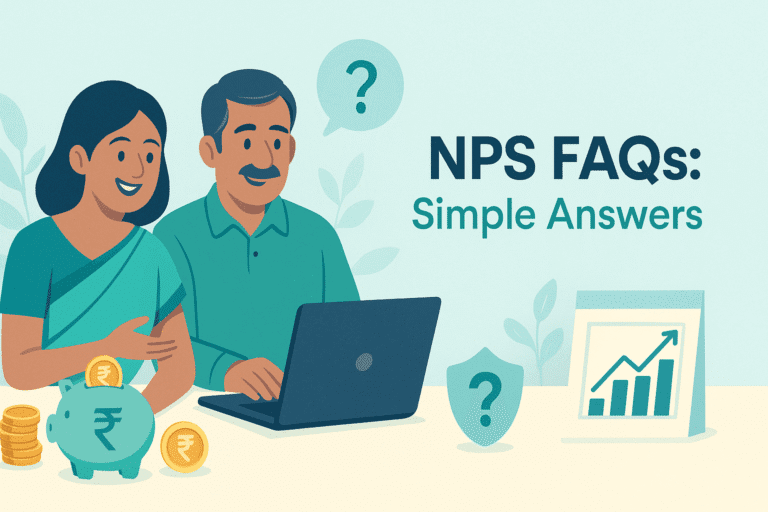NPS tax benefits explained: Save up to ₹2 lakh with India’s top retirement scheme

Are you looking for a smart way to save taxes while also framing for a secure retirement? The National Pension System (NPS) might be the perfect key for you. This is a detailed & easy to follow guide, we’ll walk you through what NPS is, how it works, its tax benefits, and why it could be your ideal financial move.
What is NPS?
The national pension system is a government backing retirement savings scheme initiated by the government of India. It is developed to help individual build a retirement corpus by making systematic investments in the time of their working years. Managed by the pension fund regulatory and development authority (PFRDA), NPS offers a mixure of safety, flexibility and growth.
Whether you are a salaried employee or a self employed or even a student over 18 years old, NPS is wide open for you.
Types of NPS Accounts
NPS has two types of accounts:
1. Tier 1 Account (Mandatory)
- This is the main account and required to enjoy tax benefits.
- Locked in until the age of 60 (though partial withdrawal is allowed under specific conditions).
- Minimum contribution is Rs. 500.
2. Tier 2 Account (Optional)
- Works more like a regular savings account.
- No tax benefits.
- You can withdraw money anytime without restrictions.
How Does NPS Work?
When you put money in NPS, your money is invested in a combination of:
- Equity (E): For high growth potential
- Corporate Debt (C): Moderate risk and return
- Government Bonds (G): Safer, lower return options
You can choose how your money is split among these (Active Choice), or let NPS handle it based on your age (Auto Choice)
Tax Benefits of NPS
One of the biggest reasons people invest in NPS is to save on taxes. Here’s how it helps:
Section 80C
- You can claim a deduction of up to Rs. 1.5 lakh per year.
- This is shared with other investments like PPF, ELSS, LIC, etc.
Section 80CCD(1B) – Extra Tax Saving
- An additional deduction of Rs. 50,000 is available.
- This is over and above the Rs. 1.5 lakh under Section 80C.
Section 80CCD(2) – Employer Contribution
- If your employer subsidize to your NPS, you can claim up to 10% of your salary (basic + DA) as an additional deduction.
- This is separate and has no upper limit within 10%.
Total possible deduction: Rs. 2 lakh or more per year!
NPS Returns: What Can You Expect?
Unlike fixed returns in PPF and FDs, NPS returns are market-linked. That means your returns relay upon how the economy & stock market perform.
- Average returns: about 8% to 10% annually (even more)
- Low fees: Fund management charges are around 0.01%, among the lowest in the world
Withdrawal Rules and Retirement Benefits
At Age 60 (Retirement)
- You can withdraw 60% of the total corpus tax-free.
- The remaining 40% must be used to buy an annuity (a plan that pays you monthly pension).
- Pension income from the annuity is taxable.
Before 60 (Early Exit)
- You can exit early, but 80% of your funds must go into annuity.
- Only 20% can be withdrawn as a lump sum.
Partial Withdrawal
You can withdraw up to 25% of your own contributions after 3 years for specific reasons like:
- Medical emergencies
- Children’s education or marriage
- Buying or building a house
How to Open an NPS Account
Online Method
- Visit: https://enps.nsdl.com
- Register with Aadhaar or PAN
- Fill in your details and make the initial contribution
- You’ll get your PRAN (Permanent Retirement Account Number)
Offline Method
- Visit any NPS-authorized bank (called POP – Point of Presence)
- Fill out the form and complete KYC
NPS vs PPF vs EPF: Which is Better?
| Feature | NPS | PPF | EPF |
| Returns | 8-10% (market based) | ~7.1% (fixed) | ~8.15% (fixed) |
| Lock-in Period | Till 60 years | 15 years | Till retirement/job change |
| Tax Benefits | Up to Rs. 2 lakh+ | Up to Rs. 1.5 lakh | Up to Rs. 1.5 lakh |
| Withdrawal | Restricted | Easy after lock-in | Restricted |
Top Fund Managers in NPS (2025)
Your money is managed by top-rated institutions. You can select your preferred one and switch later if needed.
- SBI pension fund
- HDFC pension fund
- LIC pension fund
- ICICI prudential pension fund
Final Thoughts
If you want to improve long term wealth, secure your retirement and save taxes all at once, NPS is one of the apt choices in India today. It is flexible, low-cost and backed by the government. The tax benefits alone make it a major investment option for salaried professionals and self-employed individuals.
Start your NPS account today and invest in your future the smart way!
Other NPS related posts:
National Pension System (NPS) FAQs: Simple Answers





